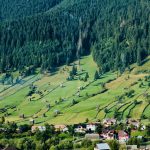In the annals of agricultural history, few figures loom as large as Albert Howard. His seminal work, “An Agricultural Testament,” stands as a testament to a lifetime dedicated to understanding the intricacies of soil, plants, and the interconnectedness of nature. Let’s delve into the background of this influential book and explore why his insights remain as relevant today as they were nearly a century ago.
The Journey to Organic Farming

Albert Howard’s journey to becoming the progenitor of modern organic agriculture began during his tenure as an agricultural researcher and administrator in India. It was there, amidst the vibrant landscapes and ancient farming traditions of the Indian countryside, that Howard’s perspective on agriculture underwent a profound transformation.
Disillusioned by the negative impacts of chemical-intensive farming practices, Howard turned his attention to the wisdom of traditional farming methods employed by Indian peasants. He observed their reverence for soil fertility, their emphasis on organic matter, and their reliance on natural pest control measures. Inspired by these observations, Howard set out to document his findings and articulate a new vision for sustainable agriculture.
The Core Principles of Sustainable Farming
In his book, Howard lays out a comprehensive framework for organic farming based on several core principles:
- Soil Health: Emphasizing the paramount importance of soil fertility as the foundation of successful agriculture, Howard argues that healthy soil is the key to productive and sustainable farming practices.
- Composting: Central to his approach is the use of compost as a means of maintaining and enhancing soil fertility. He champions composting as a natural way to recycle organic matter and enrich the soil.
- Crop Rotation and Diversity: Howard advocates for crop rotation and the cultivation of diverse crops as methods of preventing soil depletion and reducing the risk of pests and diseases. These practices help to maintain soil fertility and balance ecosystems.
- Natural Pest Control: Instead of relying on synthetic pesticides, Howard encourages farmers to adopt natural methods of pest control, such as biological controls and maintaining ecological balance.
The Enduring Legacy
Though his seminal work was published over eight decades ago, its message resonates as strongly today as it did then. Howard’s holistic approach to agriculture, grounded in principles of soil health, biodiversity, and ecological balance, laid the foundation for the modern organic farming movement.
In an era marked by growing concerns over climate change, soil degradation, and food insecurity, Howard’s insights offer a beacon of hope and a roadmap for a more sustainable future. As we grapple with the challenges of feeding a growing global population while safeguarding the health of our planet, the lessons of organic farming wisdom serve as invaluable guides.
Embracing Organic Farming Wisdom for a Sustainable Future
As we reflect on the legacy of organic farming pioneers and the principles espoused in his book, it becomes clear that the path to sustainable agriculture lies in embracing the wisdom of the past while harnessing the tools of modern science and innovation. By prioritizing soil health, biodiversity, and ecological balance, we can cultivate a future where agriculture nourishes both people and the planet.
So, let us heed the lessons of organic farming pioneers and work together to build a world where sustainable farming practices aren’t just a niche endeavor but a fundamental pillar of our agricultural systems. In doing so, we honor the legacy of visionary pioneers whose insights continue to inspire and guide us on our journey toward a more sustainable future.












